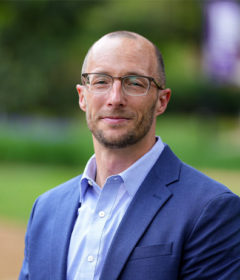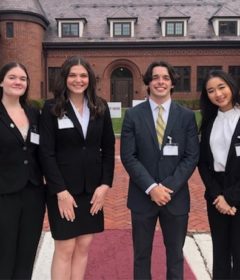Five Minutes With … Resche Hines
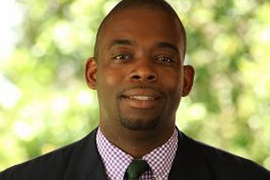
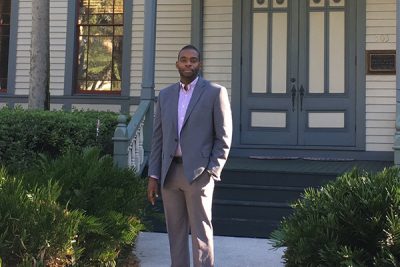
Tell us about your job at Stetson University.
My job is the one job that works with every entity on campus from the Cabinet, the Board of Trustees, Deans, Faculty, facilities, and the Help Desk in IT. Institutional Research and Effectiveness historically is the unit on campus that handled many of the institutional reporting requirements. We are responsible for the federal and state requirements. We do all the reporting to the college guides, from U.S. News & World Report, and Princeton Review. It has often been stated that we are the official data source for the University. I get the honor of leading the most talented and professional office of institutional Research in the country working daily with Patti Sanders (Research Associate) and Angela Henderson (Director of Institutional Research). The Register’s office also reports to me, led by the best Register in the nation Robert Berwick. Here at Stetson we do a great variety of projects. For instance, I recently had a meeting with Dr. Wendy Libby and interim Provost Dr. Noel Painter about the key performance indicators that we report up to the Board. We have been doing a lot of analysis around some targeted groups to help us reach our institutional retention and graduation goals. I like to say no two days are the same.
A primary focus for Institutional Research and Effectiveness is to understand how to disseminate data in a more meaningful way. We have recognized the need to find a more scalable, user-friendly solution that could empower the university’s faculty and staff to conduct their own data-driven investigations and engage students and alumni with the most up-to-date information. For my area, that meant implementing interactive data visualization tools that helped draw smarter insights from the institution’s data.
I see the role of Institutional Research evolving. On this campus and across Higher Education, we’re the one place that has a view of how everything connects across the University. Institutional Research develops educational tools to inform various stakeholders within and outside of the institution about the critical drivers of effectiveness and success. Our role is to align those drivers with best practices to move the institution forward.
How long have you worked here?
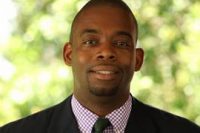
This is going into my fourth year. Before my wife Chanell and I moved to the area, we were in Chicago and, as much as I love Chicago, the cost of living for a family of five had gotten to the point where literally my wife was working to pay for day care. My wife and I had just had our third son. We had three boys under five. We decided let’s be strategic about where we move. I was looking for a good place to come with a strong reputation and that would be close enough to home – I grew up in Tampa – but also far enough away that we could get some help but also continue to establish ourselves as well. When Stetson came up, instantly I knew it was a good fit for me.
What do you like most about your work?
I like the variety in what I get to do. I get to work with a lot of broad constituencies on campus, so I get a good breadth of how a university functions. We get a deep perspective on the data so I’m aware of the underlying assumptions about a lot of what’s going on. I like the fact that we can use the data to help influence the decisions of the institution based on what’s actually happening with the data.
What’s the most important thing you’ve learned while working at Stetson?
Interestingly, I think the most important thing I’ve learned working at Stetson is that context is important. Stetson was the first private college I worked for, and, as far as context, there are similarities between publics and privates. I’ve worked in Illinois and Michigan. There is something unique about a private tuition-driven revenue college, grounded in the liberal learning experience. For instance, my last place of employment, Chicago State University (CSU) on the Southside of Chicago, was a commuter school with a significant non-traditional aged population and Stetson is a residential school. As a commuter school, a contextual driver for CSU was how the institution could better engage students to connect with the university to enhance their college experience. Specifically, move the view of campus for students from a place where students not only came to class but also saw the institution as a place where they do their homework and could integrate the campus into their lives and stay at the institution.
The context for understanding engagement at Stetson is different and designed for traditional 18- to 24-year-olds who may be from out of state. One of the primary drivers is to understand how do you engage students from all walks of life to see Stetson as their home and not get homesick? The context of each situation leads to a different understanding of those populations.
Where would you like to see Stetson in 10 years?
Stetson University has the DNA to be, I would argue, the premier mid-size institution in the South. I would like to see us reach that potential. Stetson is a very good place. I think we have the ability to be great over the next decade. It would take being intentional about how we communicate with each other and being intentional about how we share our story so that Stetson isn’t the best kept secret. When you ask someone about Stetson, they generally have the feeling that it’s a good place. So you don’t have to build up the reputation with the public. We just need to do some little things internally to ensure that we push ourselves from being a very good to a great school.
I know Stetson can be that place. We have the history. We have top-notch academic programs (undergraduate and graduate) and the Law School. We have a strong brand recognition and that will help to project the institution to where we could be the institution. We need to pick three to five areas that we’re best at, and put a stake in the ground and say this is who we are. It’s not that we don’t do all the other things well, but this is what we’re best at. For instance, we have data that shows 50 percent of our Music School graduates have gone on to graduate school over the last five years. They’re going to really strong places – the University of Michigan, Johns Hopkins University, the Eastman School of Music at the University of Rochester, the top music schools around the country. That’s a distinction for us as an institution and we need to do better to communicate that story. For us, it’s a recruiting tool. Why would they want to invest with us? This is the return on your investment.
Bio
Hometown: Tampa
Education: B.S. in psychology and M.S. in community psychology from Florida Agricultural and Mechanical University, and Ph.D. in Education Administration from Michigan State University.
Family: Married to Chanell, a project manager at DaVita Labs in DeLand who earned her M.B.A. from Stetson last year. They have three sons, 7, 6 and 3.

